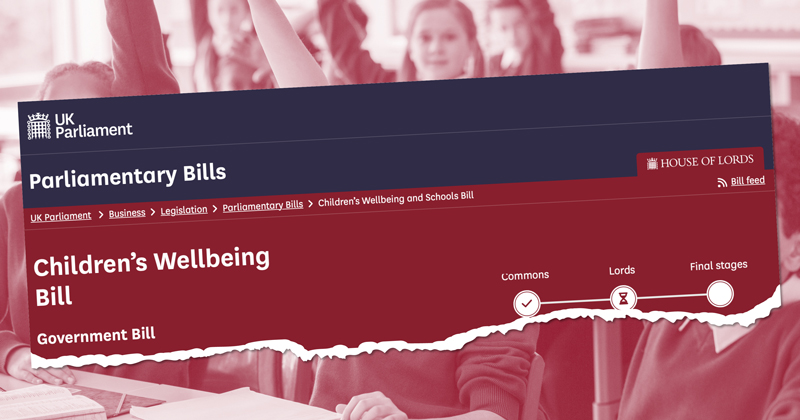Labour’s schools bill will give a “get out of jail card” to “incompetent” school leaders, and place government at risk of “endless litigation and judicial reviews”, former academies ministers have warned.
The children’s wellbeing and schools bill is now moving through the House of Lords. Much of the debate and criticism focused on Labour’s plans to row back academy freedoms.
But skills minister Baroness Smith said the reforms “make vital and practical” changes that will deliver “tangible improvements for every child as a result”.
She also confirmed the university technical colleges and studio schools will be exempt from following the national curriculum.
‘Back to the education badlands’
Lord Agnew, former Tory academies minister and Inspiration Trust chair

The bill will “plunge the education system back into the bad lands” of 20 years ago and “face a stormy passage” through the Lords.
“Ambiguity” over academisation for failing schools will “present a get-out -of-jail card for the incompetent management of those schools”.
“Organisations rot from the head down. Schools don’t fail because of the teachers but because of the people who manage them.”
He accuses Labour of “essentially condemning children to a failed education. It seems you’re not prepared to allow the hard edge of intervention to sweep out mediocrity and failure.
“The communities that you claim on your benches to represent [disadvantaged ones] will be the ones thrown under the bus under a senseless ideology.”
‘Endless litigations and judicial reviews’
Lord Nash, former Tory academies minister and Future Academies chair

While Labour “invented the academy movement [they] now seem intent on dismantling it”.
He is “concerned about the clauses taking micro-managing powers to the centre. Over-riding funding agreements, which are contracts, is never a good look.”
Councils gaining the “ability to change PANs” and “weak academisation intervention powers” mean the government is “setting itself up for endless litigation and judicial reviews. Good luck with that.”
Legislation has been “rushed out without any consultation” with leaders who have “no desire for it”.
While the government “would be well advised to scrap it and start again”, he urges ministers to “take a constructive approach on amendments”.
‘Schools must behave in right way’
Baroness Morris, Labour former education secretary

“If we want every school to be a good school,” Morris says, then “we’ve got to make sure that they don’t achieve this by behaving in a way that makes it more difficult for other schools to succeed.”
She welcomed the proposal to allow councils to challenge academy admission numbers.
This is “not because I want to take away the freedoms, but because those can be exercised in a way that makes it impossible for the school down the road to flourish and succeed”.
‘Broad curriculum needs to be an entitlement’
Baroness Bousted, former NEU boss

Bousted challenged Tory claims of “gains” made during their time in office, pointing out the “Forgotten Third scandal” and funding squeeze.
“For a party that reduced spending in schools in such a savage way in real terms over a decade, the idea that they would support unfilled places throughout the country in order for academies to determine their pupil intakes is frankly unbelievable.
“Surely this is a prime example of an ideology that supports structures, not standards.”
She says curriculum reforms will ensure a “broad and balanced curriculum” is an “entitlement”, and all teachers having to be qualified is a “social justice issue”.
The bill is “ambitious, positive for all our children, is proportionate and necessary”.
‘When did centralisation ever lead to innovation?’
Lord Fink, Ark Schools trustee

The Conservative peer says the schools bill “does not strengthen our system: it centralises it, homogenises it and risks extinguishing the very freedoms that made academies and vast parts of our schools system successful in the first place”.
Fink also questions “when did centralisation ever lead to innovation?”
“Academies have done more for social mobility than any single government policy over the last 25 years and it was initiated by New Labour. We mustn’t let political short-term theatre dismantle the long-term and cross-party progress we’ve made in education policy.”
‘Refer MAT executive salaries to teacher pay board’
Lord Knight, former Labour academies minister and E-ACT trust chair
Academies have “by and large worked well”, Knight said, but this is “not because of the
freedoms promised, it is much more due to strong governance and effective leadership”.

But he had “concerns” that “unfettered” use of new powers to issue compliance orders
to academies “could interfere with good governance”.
He also suggested “exploring whether the pay of senior MAT executives should be
referred to the STRB [the teacher pay body] so trust remuneration committees receive
guidance to prevent pay inflation”.
The bill puts “children’s interests, not structures or ideology at the centre of reform”, he added.
‘The system is not working well enough for all’
Baroness Smith, government skills minister
Responding to the feedback, Smith said the bill makes a “significant contribution to this Government’s mission to dismantle barriers to opportunity”.
On academies, she said “high-quality trusts have been critical in driving school improvement over the last two decades”.
“We want to build on this success and we want high-quality academy trusts to grow,” Smith added.

But she said the “system is not working well enough for all”, with “significant issues” including attainment and attendance.
“While the best trusts have spread innovation and excellence across the system, academisation is not always the answer,” she added. “Even when it is, on too many occasions it has been too slow.”
She said the “least compelling arguments” came from those “more concerned about a defence of structures and status quo”.
“I have to say that some of what we have heard from those opposite smacks of complacency, not of consensus. The true consensus is among those who know that tackling underperformance needs urgency, innovation and a range of tools.
“As for some of the comments made about the RISE teams that are starting work, I am not sure that noble Lords in this place want to be referring to successful school leaders as “clipboard-carrying bureaucrats”, as some have.”
















Your thoughts